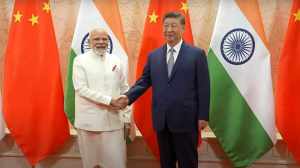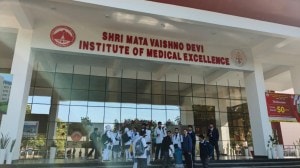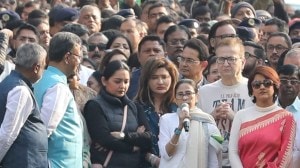Bush: BJP asks PM to talk within consensus limits
Afraid that the Left was monopolising the entire 8216;8216;anti-US8217;8217; and 8216;8216;nationalist8217;8217; space on the eve of...

Afraid that the Left was monopolising the entire 8216;8216;anti-US8217;8217; and 8216;8216;nationalist8217;8217; space on the eve of US President George Bush8217;s visit to the country, the BJP today stepped in to warn the government to be 8216;8216;mindful of the parameters of national consensus8217;8217; during bilateral talks later this week. It also demanded that India raise the AQ Khan issue and the role of Pakistan as the 8216;8216;lynchpin8217;8217; of the illegal trade in nuclear technology with the visiting US delegation.
In an 8216;8216;open letter8217;8217; to PM Manmohan Singh, BJP chief Rajnath Singh laid particular emphasis on the Indo-US nuclear deal and the Kashmir issue. 8216;8216;No Indo-US understanding on nuclear matters will be acceptable unless they factor the dynamics of a credible and effective nuclear deterrence as determined by us and preserve India8217;s status as an independent nuclear power,8217;8217; he wrote.
On Kashmir, Singh expressed concerns over suggestions of a US mediatory role and underlined that 8216;8216;the national consensus is quite clearly against any third-party mediation and the redrawing of national boundaries.8217;8217;
Unlike the Left and Samajwadi Party, the BJP is not against Bush8217;s visit. Formally welcoming the visit, the BJP chief said: 8216;8216;We believe it provides an opportunity for US policy-makers to understand the importance of India in the world and appreciate our concerns.8217;8217; He, however, said it was 8216;8216;regrettable8217;8217; that the government 8216;8216;has not cared to keep the premier Opposition party and the NDA informed8217;8217;. Since national interests demand a bipartisan foreign policy, 8216;8216;we consider this lack of transparency a major lapse of the government8217;8217;, Singh said.
The BJP called upon the PM to broach cross-border terror and proliferation of nuclear technology. 8216;8216;Pakistan has resisted international pressure to bring the rogue scientists to book,8217;8217; Singh wrote, urging the PM to 8216;8216;impress upon the US the need to apply diplomatic pressure on Pakistan and its military-nuclear establishment8217;8217;.
The BJP had a note of encouragement too. The letter underlined that Indo-US ties in agricultural technology was necessary for India to achieve a Second Green Revolution, and urged the PM to take up the question in right earnest.
- 01
- 02
- 03
- 04
- 05































